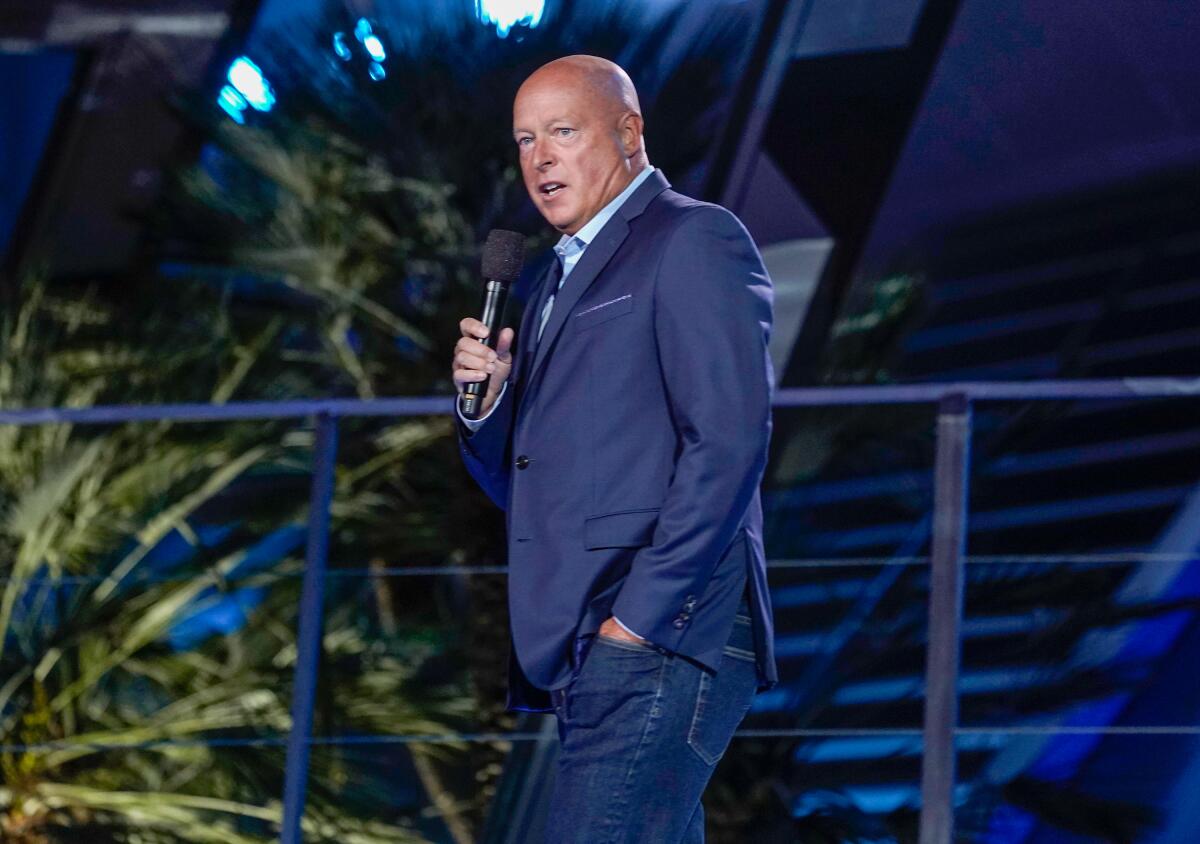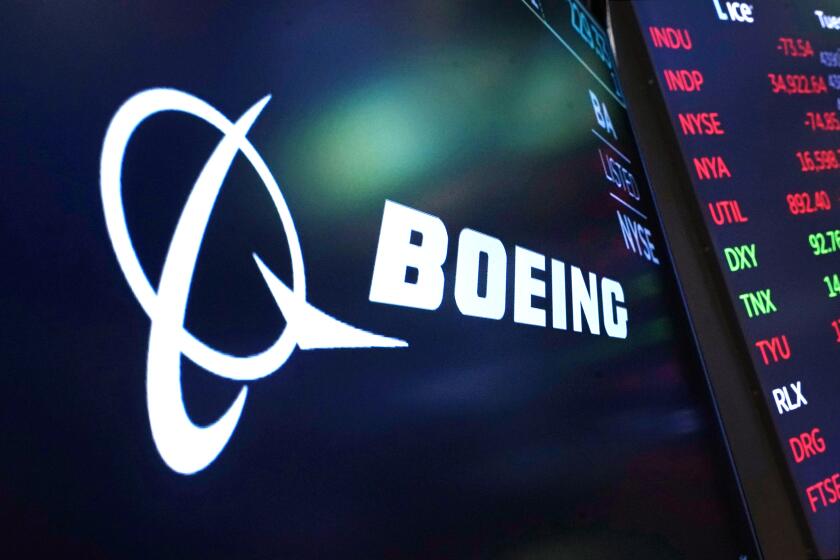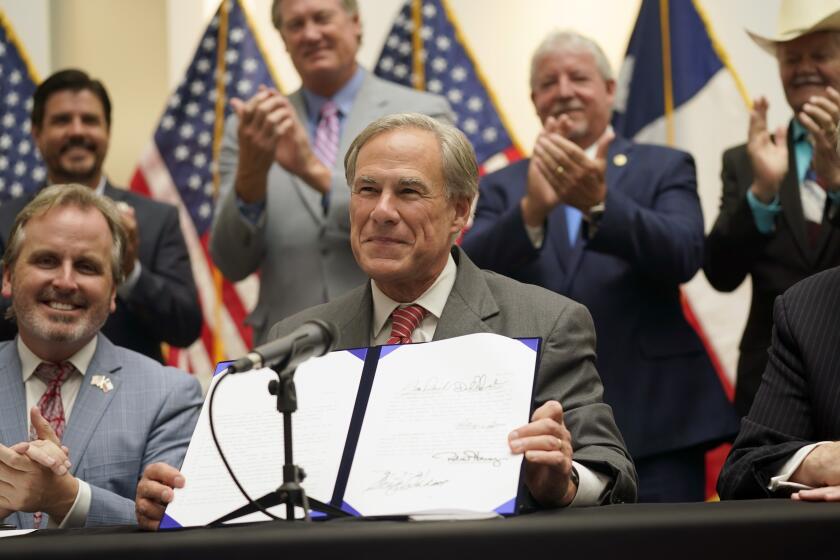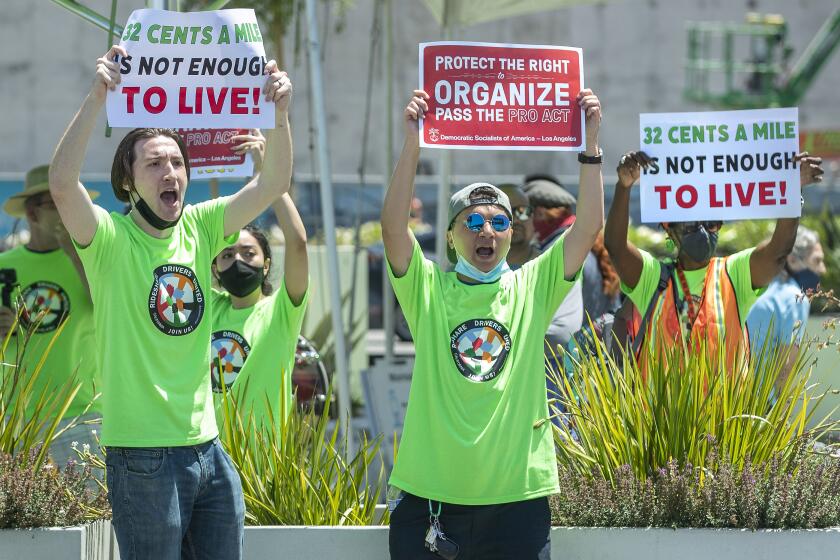Column: On Florida’s ‘Don’t Say Gay’ bill, Disney sets a new standard for corporate cowardice

- Share via
It has become increasingly clear that relying on American corporations for moral leadership is a mug’s game.
The Walt Disney Company has just made itself Exhibit A.
At issue is a brutal assault on the teaching of gender issues formally titled the Parental Rights in Education bill, but dubbed by its critics the “Don’t Say Gay” bill.
Our diverse stories are our corporate statements — and they are more powerful than any tweet or lobbying effort.
— Walt Disney CEO Bob Chapek
The measure received its final legislative approval from the Florida Senate on Tuesday and is almost certain to be signed by Republican Gov. Ron DeSantis.
The bill would ban classroom discussions about “sexual orientation or gender identity” through third grade and place limits on those discussions in upper grades.
Get the latest from Michael Hiltzik
Commentary on economics and more from a Pulitzer Prize winner.
You may occasionally receive promotional content from the Los Angeles Times.
Disney, the most powerful public corporation in Florida, has been silent as the tomb on the measure while it has made its way through the legislature.
As my colleague Ryan Faughnder reported, the company’s failure to take a public stand led to a meeting Friday between LGBTQ+ leaders within the company and CEO Bob Chapek, and subsequently to an all-hands memo by Chapek addressing the topic.
Chapek tied himself in knots justifying the company’s silence. “Corporate statements do very little to change outcomes or minds,” he wrote. “Instead, they are often weaponized by one side or the other to further divide and inflame. Simply put, they can be counterproductive and undermine more effective ways to achieve change.”
Then he put in a plug for Disney’s entertainment products. “We are telling important stories, raising voices, and I believe, changing hearts and minds,” he wrote. “Encanto, Black Panther, Pose, Reservation Dogs, Coco, Soul, Modern Family, Shang-Chi, Summer of Soul, Love, Victor.”
Goldman Sachs, Comcast, AT&T and others are quietly supporting attacks on abortion and voting rights.
Chapek continued: “These and all of our diverse stories are our corporate statements — and they are more powerful than any tweet or lobbying effort. I firmly believe that our ability to tell such stories — and have them received with open eyes, ears, and hearts — would be diminished if our company were to become a political football in any debate.”
It should be crystal clear that this is corporate claptrap. It’s aimed at preserving Disney’s ability to pump out anodyne depictions of the world without suffering the least bit of partisan pushback.
No one should be fooled by Chapek’s assertion in the memo that “We all share the same goal of a more tolerant, respectful world. Where we may differ is in the tactics to get there.” Or by his statement that “the best way for our company to bring about lasting change is through the inspiring content we produce, the welcoming culture we create, and the diverse community organizations we support.”
Chapek’s position elevates Disney’s purely commercial interests over the welfare of its employees and the interests of its own neighbors in Florida. The company isn’t unique in acting this way. As we’ve reported, scores of important corporations have paid lip service to elevated moral and political principles while supporting the meanest political leaders with greenbacks.
When the opportunity arises for public companies to balance the costs of taking a public stand on principle against the value of remaining silent, more often than not they choose silence. Big Texas-based companies have chosen not to speak out against that state’s horrific antiabortion law, even though it would have direct impacts on their own workers.
Atlanta-based Delta Air Lines and Coca-Cola expressed displeasure over Georgia’s voter-suppression legislation, but only after it was already enacted into law. Prior to then, they were silently plying legislators who supported the bill with campaign contributions.
So let’s take a closer look at what Disney really thinks about the power of any “lobbying effort.” The truth is, Disney lets its money talk plenty loudly when it wants to protect its corporate interests.
Corporate America has been almost silent on a Texas law that bans most abortions and promotes vigilantism. That’s no surprise when its own interests are at stake.
To begin with, as Scott Maxwell of the Orlando Sentinel reported last month, the company has given campaign money to “every single sponsor and co-sponsor” of the “Don’t Say Gay” bill. Among them is the measure’s Senate sponsor, Republican Dennis Baxley, a consistent supporter of antigay measure in the legislature, including laws to prohibit adoptions by gay couples.
Over the last two years, according to Judd Legum of the Popular Information website, the company has donated $197,126 to House members and Senate committee members who have already voted in favor of the “Don’t Say Gay” bill.
Chapek addressed that issue in his memo: “While we have not given money to any politician based on this issue, we have contributed to both Republican and Democrat legislators who have subsequently taken positions on both sides of the legislation,” he acknowledged, employing the childish right-wing adjective for members of the Democratic Party.
Chapek didn’t bother to articulate the company’s purpose in contributing anything to any member of the Florida legislature. But he probably didn’t have to: The purpose is to preserve the company’s influence in Florida politics.
Political leaders have swarmed into the void created by Disney’s silence on “Don’t Say Gay.” Gov. DeSantis, whose career purpose appears to be testing how thorough a vacuum he can create in the jar where politicians store their moral authority, has strongly signaled his support of the measure: “How many parents want their kids to have transgenderism or something injected into classroom instruction?” he said Friday.
The bill, DeSantis said, is “basically saying for our younger students, do you really want them being taught about sex?... Clearly right now, we see a focus on transgenderism, telling kids they may be able to pick genders and all of that.”
DeSantis’ grotesquely truculent spokeswoman, Christina Pushaw, has accused critics of the bill of acting like pedophiles. “If you’re against the Anti-Grooming bill, you are probably a groomer or at least you don’t denounce the grooming of 4-8 year old children,” she tweeted last week. “Silence is complicity. This is how it works, Democrats, and I didn’t make the rules.”
What’s especially dispiriting about Chapek’s hands-off policy over “Don’t Say Gay” is the massive power of the Walt Disney Company to get what it wants from the state’s political leaders. That power derives from the gravitational mass of Walt Disney World, located outside Orlando. Disney World, which opened in 1971, established Central Florida as a world-class vacation destination.
A California judge got it right: Prop. 22, California’s gig economy law, outrageously trampled on employee rights.
To lure the company to what was then the middle of nowhere, Florida gave the company near-governmental land use authority over a vast tract of farmland. The development district carved out for Disney a half-century ago is exempt from most state regulations and has its own police and fire departments, taxing power and building code, according to the Tallahassee Democrat.
The tourism industry Disney created produces an annual economic impact of $75.2 billion for the region and more than 460,000 jobs, according to a 2019 study. The sales tax collected on the 58 million Disney World tickets sold in 2018 alone was $409 million, more than the state’s 2021 budget for on school construction and maintenance, the Tallahassee Democrat reported.
Do you really think that Disney could not have swayed the Florida legislature by taking a public stand on “Don’t Say Gay”?
It’s proper to note that Chapek’s predecessor and mentor, former CEO and Chairman Robert Iger, has spoken out about the bill, tweeting last month that “if passed, this bill will put vulnerable, young LGBTQ people in jeopardy.” Iger was seconding a statement by President Biden panning “this hateful bill.”
It’s also proper to note that much of the financial support Disney has provided to supporters of the bill was doled out on Iger’s watch. Iger announced Chapek’s ascension as CEO in February 2020, but didn’t formally retire as CEO and chairman until last Dec. 31. In the interim, Iger and Chapek ran the company together.
Let’s be clear: States are voting on and passing attacks by the carload on LGBTQ+ citizens, women seeking reproductive healthcare rights, and voters of color. We’re past the stage when “telling important stories,” as Chapek put it, for the price of a theater ticket or a streaming service subscription is an adequate substitution for exerting political pressure to achieve necessary social and political goals.
If Disney really wants to “unequivocally stand in support of our LGBTQ+ employees, their families, and their communities,” to quote Chapek’s memo, then it needs to take a public stand and deprive Florida’s reactionary politicians of campaign contributions. That would be a truly unequivocal stand.
More to Read
Get the latest from Michael Hiltzik
Commentary on economics and more from a Pulitzer Prize winner.
You may occasionally receive promotional content from the Los Angeles Times.














